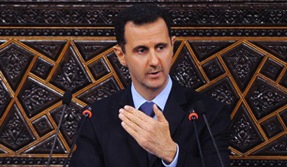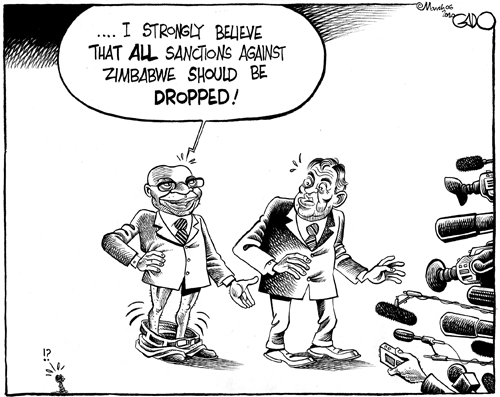Sanctions are a hard form of economic power that Joseph Nye discusses in chapter three of his new book, The Future of Power, and a topic that is discussed widely today in relation to Syria. Many policy makers are pondering whether sanctions will be useful in convincing President al-Assad to stop killing his people. No doubt some in the camp that support sanctions would point to the smart sanctions that Rose Gottemoeller discusses in her article, The Evolution of Sanctions. She claims this progress has taken place after the world noted the failure of the blanket use of the measure against the Iraq regime that lead to suffering by the target population as a whole, and the corruption it bred. Gottemoeller suggests that smart sanctions “have been honed through the ‘war on terror’, and sanctions are hitting their targets among corrupt elites more often” (109). Many argue that sanctions are better than doing nothing, and a step below military engagement. This enables countries with public opinions that do not support the sacrifice of blood and treasure to still make their preference known in a forceful way. However, despite the near constant stream of sanctions and their intellectually enhanced offspring in the past decade, where do we see successes? Nye explains where economic power can be seen in the world today, but doesn’t place it fully into a country’s diplomatic toolkit. For example, many of the United States’ links with China are symbiotic and the circular relationship requires both sides to make policy changes in order to move forward. Certainly sanctions, as a piece of the arsenal of power could not solve this problem. Thus sanctions as a mode of influence have a fairly limited scope of use, even the ‘smart’ kind.
failure of the blanket use of the measure against the Iraq regime that lead to suffering by the target population as a whole, and the corruption it bred. Gottemoeller suggests that smart sanctions “have been honed through the ‘war on terror’, and sanctions are hitting their targets among corrupt elites more often” (109). Many argue that sanctions are better than doing nothing, and a step below military engagement. This enables countries with public opinions that do not support the sacrifice of blood and treasure to still make their preference known in a forceful way. However, despite the near constant stream of sanctions and their intellectually enhanced offspring in the past decade, where do we see successes? Nye explains where economic power can be seen in the world today, but doesn’t place it fully into a country’s diplomatic toolkit. For example, many of the United States’ links with China are symbiotic and the circular relationship requires both sides to make policy changes in order to move forward. Certainly sanctions, as a piece of the arsenal of power could not solve this problem. Thus sanctions as a mode of influence have a fairly limited scope of use, even the ‘smart’ kind.
Even if the ‘smart’ sanctions that are now touted as battled proven are implemented, their success can only come against those that are genuinely disrupted by their execution. The Economist rightly points out the fact that despite Robert Mugabe’s wife is no longer able to take strolls down the Avenue des Champs-Elysées with a government credit card in hand, the ruling Zimbabwean African National Union – Patriotic Front party still remains in control of the country. Despite the power of the purse, the discomfort of Grace Mugabe is unlikely to spark a political hand over of power. Even in a place where sanctions are championed, the Republic of South Africa, boycotts did little to affect the policy or actions of the apartheid-supporting National Party in Pretoria. South Africa simply turned their massive industrial economy into producing the replacements for arms and other necessities. The National Party managed boycotts and sanctions for decades without any reprisal from their constituents because of the siege mentality they constructed, the effective ways South Africa skirted the boycott, and by creating an effective propaganda and censorship system that did not make wealthy South Africans perceive any severe hardships. Only when the mighty Springboks were threatened did the South African public begin to question National Party rhetoric. Still, it took a once-in-a-lifetime figure of Nelson Mandela to negotiate his party to power, showing that the art of diplomacy can yield real results when wielded by a skilled peacemaker.
However, in case any claims of success still stem from the use of sanctions in South Africa, the rate of change should be noted. It was over 40 years from when the United Nations first passed the arms boycott against the Republic until the liberation movement succeeded in bringing Nelson Mandela to power. Should the people of repressive regimes be told by the UN today that their actions should bear results in time for their grandchildren to vote?
Sanctions also add a hinderance to the diplomatic process of spreading democratic ideals and enforcing human rights because sanctions become another bargaining chip for the targeted regime to use to either slow down the process or to use as a propaganda tool. Mugabe can tout sanctions as a racist/colonialist/imperialist/western ploy (depending on his mood of the day) as a way to retake the country. Despite all evidence to the contrary, this propaganda still resonates with some Zimbabweans, which will make it more difficult for Zimbabwe to reintegrate with the world economy and community when the day comes that Mugabe loses power and a democratic Zimbabwe emerges.
Sanctions even affect regional hegemons’ actions. Just this week, Jacob Zuma urged the lifting of sanctions on Zimbabwe when an envoy from the European Union visited Pretoria. Zuma is in no rush to facilitate the downfall of his one-time liberation comrade and current dysfunctional neighbor. As far as Zuma is concerned, Uncle Bob might as well stay around for as long as possible so that Zuma can pass that responsibility for nation re-building and dealing with the influx of Zimbabwean refugees and job hunters onto the next African National Congress party president. By using the sanctions card, Zuma can continue to punt on the topic rather than spend any domestic political capital to deal with the situation.
Any real diplomatic strategy the EU could devise for Zimbabwe will now be forced to gain acquiesces from a non-committal Zuma. With the EU sanctions in place, the EU will lose face if they were to ease sanctions and then not see any constitutional reform or power hand over in Zimbabwe. Thus any moral recognition that the EU would have gained by championing human rights in Southern Africa would be contrasted by yet again another failure to exert power on regional leaders to exact change. When the EU was prepared to get serious about Zimbabwe, they should have sent diplomats to ZANU-PF with real carrots (trade agreements, aid packages) and real sticks (military intervention). At the very least, the EU could have coordinated a public diplomacy strategy for the county that would take just as long as sanctions, but have a greater chance of helping the country emerge a friendlier and more competent nation.
Contrast the world’s engagement with Zimbabwe with the actions taken this spring by the United Nations, but notably France, after the election in Cote d’Ivoire. After an election that was judged to be free and fair, the legitimate winner of the election, Alassane Ouattara, rejected suggestions from a delegation from the African Union (which had Thabo Mbeki, South Africa’s former president among it) to settle for a power-sharing agreement, a la Zimbabwe in 2008. Ouattara coordinated a military resistance to the stolen election, and in the end received support from UN peacekeepers, but more importantly, French helicopter gunships, which helped bring down former President Laurent Gbagbo. The time frame between the election and Ouatarra’s swearing in was six months.
With the idea that sanctions on Libya brought about any substantial shift in Gaddafi’s regime proven to be false after his actions this spring, Switzerland stands alone as the remaining case that has been championed by sanction supporters which can withstand scrutiny. Thus if sanctions can only work to bring about policy change in hostile, less than democratic nations in a time frame of one generation, why would sanctions be discussed in regards to Syria?
As Gottemoeller writes, policy refuge is the main goal of sanctions. However, she seems to imply that the next-generation style of sanctions can overcome some of the challenges in the past. Her claims that the financial reforms found in the USA Patriot Act have had a distinct impact on the global terrorism are worth noting, but not relevant to the currant usage of sanctions as part of the nation to nation diplomatic toolkit. She claims that smart sanctions have also benefitted the movement to restrict North Korea’s black-market initiatives, but as of today, these supposedly ‘clever’ new punitive actions seem to have resulted in little policy change.
Thus, perhaps the take away from these readings are that sanctions against nation-states are an easy way out for a country’s diplomatic and political representatives. Sanctions do appear to work against non-state actors that rely on the liquidity of the financial markets to fund themselves as they have no populace to tax or national treasuries to pillar. Instead of using sanctions as a substitute of military and diplomatic power, these should be seen as two exclusive toolkits. The use of sanctions against organizations and people that rely on direct funding for their operations, and whose money supply lines are critical to continued success is a proper use of this economic power. In cases where tyrannical political and military leaders already have stockpiles of weapons, a national treasury to loot, and a conscriptable population, military and diplomatic power should be deployed.
In lieu of deploying the United States’ military power in places like Iraq and Afghanistan where the building process for democratic rule begins at nil, American emphasis should be placed on supporting established democratic movements in Zimbabwe and Cote d’Ivoire instead of trying to pacify the global empathetic outpouring for repressed democratic movements by implementing the failed economic power strategy of sanctions.

Pingback: درباره ی تحریم ها | تاملات نیمه دودی